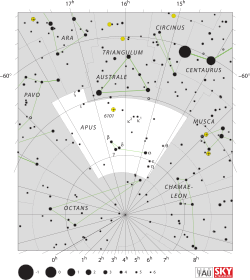Theta Apodis
| Observation data Epoch J2000 Equinox J2000 |
|
|---|---|
| Constellation | Apus |
| Right ascension | 14h 05m 19.87784s[1] |
| Declination | –76° 47′ 48.3204″[1] |
| Apparent magnitude (V) | 5.7[2] |
| Characteristics | |
| Spectral type | M7 III[2] |
| U−B color index | +1.07[3] |
| B−V color index | +1.48[3] |
| Variable type | Semiregular[2] pulsating |
| Astrometry | |
| Radial velocity (Rv) | +9.0[4] km/s |
| Proper motion (μ) | RA: –87.54[1] mas/yr Dec.: –32.54[1] mas/yr |
| Parallax (π) | 8.84 ± 0.49[1] mas |
| Distance | 370 ± 20 ly (113 ± 6 pc) |
| Absolute magnitude (MV) | 0.7[2] |
| Other designations | |
Theta Apodis (θ Aps, θ Apodis) is the Bayer designation for a star in the southern circumpolar constellation of Apus. It is a variable star with a mean apparent visual magnitude of 5.7,[2] which, according to the Bortle Dark-Sky Scale, means it is a faint star but visible to the naked eye from dark suburban skies. The distance to Theta Apodis is approximately 370 light-years (110 parsecs), based upon parallax measurements made from the Hipparcos spacecraft.[1] It is unusual in that it is a red star with a high proper motion (greater than 50 milliarcseconds a year).[6]
This is an evolved red giant that is currently on the asymptotic giant branch,[7] with a stellar classification of M7 III.[2] It is a semiregular pulsating variable and its brightness changes over a range of 0.56 magnitudes with a period of 119[2] days. It is losing mass at the rate of 1.1 × 10−7 times the mass of the Sun per year through its stellar wind. Dusty material ejected from this star is interacting with the surrounding interstellar medium, forming a bow shock as the star moves through the galaxy. The stand-off distance for this front is located at about Lua error in Module:Convert at line 1851: attempt to index local 'en_value' (a nil value). from Theta Apodis.[7]
Theta Apodis has been identified as an astrometric binary, indicating that it has an orbiting companion that causes gravitational perturbation of the primary star.[8]
References
- ↑ 1.0 1.1 1.2 1.3 1.4 1.5 Lua error in package.lua at line 80: module 'strict' not found.
- ↑ 2.0 2.1 2.2 2.3 2.4 2.5 2.6 Lua error in package.lua at line 80: module 'strict' not found.
- ↑ 3.0 3.1 Lua error in package.lua at line 80: module 'strict' not found.
- ↑ Lua error in package.lua at line 80: module 'strict' not found.
- ↑ Lua error in package.lua at line 80: module 'strict' not found.
- ↑ Lua error in package.lua at line 80: module 'strict' not found.
- ↑ 7.0 7.1 Lua error in package.lua at line 80: module 'strict' not found. See table 1, IRAS 14003-7633.
- ↑ Lua error in package.lua at line 80: module 'strict' not found.
